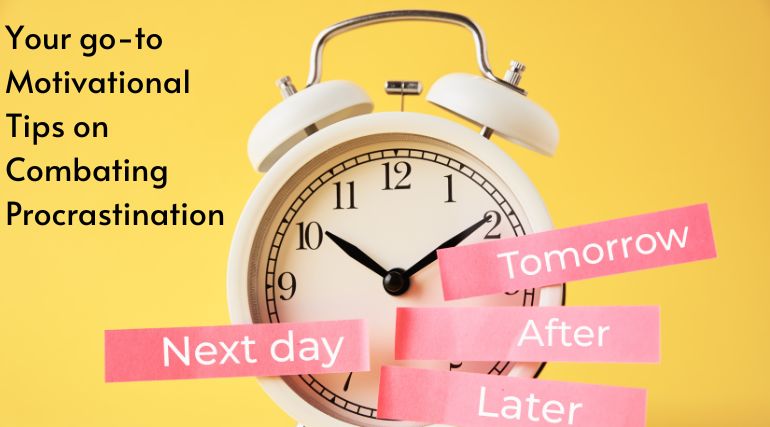Does the sentence "I'll start doing it on Monday" ring a bell? There's hardly anybody who hasn't procrastinated in their lives. Think about the start of the year and the objectives you've been putting off for so long. The goals in question are probably a list of ideas you wrote down when feeling excited.
It might be challenging for many people to change their habit of persistent procrastination. You probably question your ability to stick to schedules very frequently. In our previous blog, we answered the questions regarding the procrastination puzzle and what is needed to overcome it.
Let's explore some of the finest books and TED Talks about procrastination to assist you in being resourceful after examining the nature and algorithms of this unproductive mindset.
Books on combating procrastination
1. Eat That Frog! 21 Ways to Stop Procrastinating and Get More Done in Less Time by Brian Tracy
Our list of the best books to help you avoid procrastination scarcely has a more striking title. After all, Eat That Frog! has been translated into 23 different languages and offers not just a few but 21 practical strategies for overcoming procrastination and being the productive person you've always wanted to be.
2. Drive: The Surprising Truth About What Motivates Us by Daniel H. Pink
Motivation and inspiration might appear to be twins at times. You can never predict when they will come to see you. And each time, it turns out that you were not ready for their sudden departure. The reality is that Drive by Daniel H. Pink will explain everything, and it will help you unlock the secret of motivation. Does having this knowledge aid in maintaining motivation? Yes. Based on this information, is Drive one of the finest books to help you quit procrastinating? Definitely!
3. The Willpower Instinct: How Self-Control Works, Why It Matters, and What You Can Do to Get More of It by Kelly McGonigal
We tend to underestimate how powerful our willpower is. But it's important to understand how to utilize and regulate it effectively. A wonderful resource for fighting procrastination is The Willpower Instinct. Why is it the case? Because it explains the workings of willpower and shows you how to take control of your life in a way that leaves no room for sloth. Simple!
4. Do the Work: Overcome Resistance and Get Out of Your Own Way by Steven Pressfield
If we don't feed it, procrastination is not all that strong. But it also implies that we often stand in the way of what we really desire and are our own worst enemies. Do the Work is a book you need to read if you want to stop getting in your own way and learn how to concentrate on what counts. There is no way that this book, which is among the best in its field, would provide you with no new ideas to apply to your life.
5. Atomic Habits by James Clear
Establishing enjoyable, healthy routines is the first step in defeating procrastination. Your success and happiness are all based on your minor and large habits. Our everyday lives and routines include procrastination, smoking, reading, binge-watching Netflix, napping, and drifting off on social media.
Procrastination may be eliminated by altering your behaviors, and this book shows you how to accomplish it.
The Atomic Habits book explains how habits develop and how to simply establish new ones. It shows how changing your identity through a new habit may enhance your life and help you get out of the procrastination rut. This book is the only one on how to stop procrastinating that is as actionable as it is.
Some TED Talks to get you through procrastination
1. The Surprising Habits Of Original Thinkers, by Adam Grant
Adam Grant strikes a balance between "procrastinators" and "precrastinators" in this video, expanding on the ideas of the "instant gratification monkey" and "the panic monster" and giving life to a productive and creative character.
He uses Martin Luther King Jr.'s postponement of drafting his speech as an illustration of how many notable people throughout history were procrastinators. The leader's original words, "I have a dream," were not part of the script; by deviating from the plan, he left himself up to all possibilities.
When you go further into the relationship between original thinkers and procrastinators, you may understand how one must be better and different than the first to advance something forward.
2. Inside the Mind of a Master Procrastinator, by Tim Urban
Tim Urban offers his humorous take on the problem of procrastination and delves into the mentality of a procrastinator. He continues by describing how "precrastinators" have a reasonable decision-maker in their heads, but "procrastinators" have two more entities: the "immediate gratification monkey" and "the panic monster."
The video will teach you how to avoid giving in to the "instant gratification monkey" anytime you have work to finish.
3. Trust The Procrastinator, by Valerie Brown
This procrastinating speech is, in our opinion, among the greatest on the TedTalks platform. We live in a world where everyone wants everything immediately away, according to Valerie Brown, and procrastinators aren't among those "right-now" individuals.
She uses Leonardo Da Vinci as an example of a tremendous procrastinator who felt like a failure at one point in time and took 16 years to create the Mona Lisa. She offers us a different viewpoint on procrastinators by pointing out that it isn't always detrimental to one's job or health.
4. Change Anything! Use Skillpower Over Willpower, by AI Wizler
Al Wizler, one of the founders of VitalSmarts, uses the example of her mother's smoking habit, which she tried to kick for years but was unable to do. Cancer eventually claimed her life.
He serves as a reminder that we should exert control over the factors influencing our choices rather than allowing them to do so. You will discover the value of self-reflection, how to recognize your behaviors, and how to start changing them in this talk.
5. Procrastination Is The Key To Problem Solving, by Andrea Jackson
We may divide procrastinators into two types, according to Andrea Jackson: inadvertent and intentional. In the first category, she places Leonardo Da Vinci, and in the second, Thomas Edison.
In one passage, she compares those who postpone to those who are able to solve a supersonic jigsaw puzzle in their minds. By this, she indicates that when one procrastinates and continues to ponder about something, thousands of thoughts flood their minds. She characterizes Aristotle and Salvador Dali as purposeful put-offers who put off tasks to do more creative work. Discover a fresh viewpoint on procrastinators by listening to this talk.












